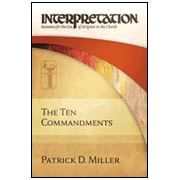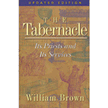In number of pages, the Torah (Genesis through Deuteronomy, also called the Law, the Law of Moses, the Books of Moses, or just “Moses,” and the Pentateuch, meaning “Five Scrolls”) constitutes more than 20% of the Hebrew Bible. It has always been regarded by the Jews as the first and most important part. Here are some biblical commentaries to serve as tools for understanding the Torah. Here and there, to help you along, I have added comments, which are all in this same navy-blue color and in bold. —Steve
PENTATEUCH GENESIS EXODUS 10 COMMANDMENTS THE TABERNACLE LEVITICUS NUMBERS DEUTERONOMY
All five books (Genesis – Deuteronomy)
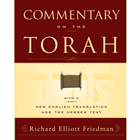 Commentary on the Torah
Commentary on the Torah
By Richard Elliott Friedman / Harpercollins Publishing (paperback edition)From the critically acclaimed author of The Hidden Book in the Biblecomes an all-new translation of the five books of Moses, together with the original Hebrew text and insightful commentary. Friedman, a top Jewish scholar, integrates recent biblical discoveries with his own expertise in comparative literature to present the Torah as one cohesive literary![]() masterpiece. 704 pages, soft cover from HarperCollins.
masterpiece. 704 pages, soft cover from HarperCollins.
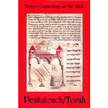 Mercer Commentary on the Bible, Volume 1–Pentateuch/ Torah
Mercer Commentary on the Bible, Volume 1–Pentateuch/ Torah
By Edited by Watson E. Mills & Richard F. Wilson / Mercer Press
Volume 1 of the Mercer Commentary on the Bible (MCB) comprises commentaries on the Pentateuch/Torah with several appropriate articles from the Mercer Dictionary of the Bible (MDB). This convenient text is for the classroom and in fact for anyone who wishes to focus on other appropriate groups of canonical writings. Each volume includes MCB commentaries and appropriate articles from MDB.![]()
The Five Books of Miriam: A Woman’s Commentary on the Torah
By Ellen Frankel / Harpercollins Publishing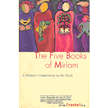 (PUBHarperCollins) Now in softcover!
(PUBHarperCollins) Now in softcover!
The noted folklorist creates imaginative conversations between figures in the Torah (Miriam, Esther, Dinah, Lilith) and leading female voices throughout Jewish history, debating major aspects of work, marriage, women’s role in community, one’s relationship to God, and lots more. 384 pages, softcover.![]()
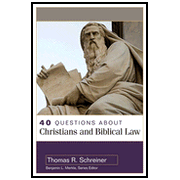 40 Questions About Christians and Biblical Law
40 Questions About Christians and Biblical Law
By Thomas R. Schreiner / Kregel Academic & Professional
Pastors, students, and laypeople will welcome Schreiner’s easy-to-understand Q&A interpretation of the interplay between the Levitical law of the Old Testament, the law of love laid out in the New Testament—and the implications of![]() both for contemporary issues such as the Sabbath, tithing, theonomy, and preaching. Includes annotated bibliography; and Scripture and ancient sources indexes.
both for contemporary issues such as the Sabbath, tithing, theonomy, and preaching. Includes annotated bibliography; and Scripture and ancient sources indexes.
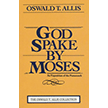 God Spake By Moses
God Spake By Moses
By Oswald T. Allis / P & R Publishing
As a leading conservative scholar of his generation, Allis (1880-1973) defends the Mosaic authorship of the entire Pentateuch and focuses on the Pentateuch as a revelation from God to His chosen people. This volume has been in print for so long because of its value as a resource for those accepting God’s Word at face value:![]() His message for humanity inspired by His Spirit. Highly recommended. —Steve For a taste of Allis’s positions and writing style, read this excerpt: “The Mosaic Tradition and the Consequences of Rejecting It”.
His message for humanity inspired by His Spirit. Highly recommended. —Steve For a taste of Allis’s positions and writing style, read this excerpt: “The Mosaic Tradition and the Consequences of Rejecting It”.
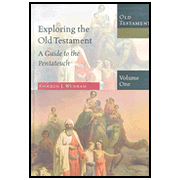 Exploring the Old Testament, Volume 1: A Guide to the Pentateuch
Exploring the Old Testament, Volume 1: A Guide to the Pentateuch
By Gordon J. Wenham / IVP Academic
Exploring the Old Testament Volume 1: A Guide to the Pentateuch aims to help students study the Pentateuch, the first five books of the Hebrew Bible. Like other volumes in the EOT and ENT series, it is intended to give the student a primary resource to enable him or her to study the texts independently. It provides an introduction to each book, which includes a survey of the main trends in recent study of the book, and takes a look at some of the literary techniques used in the Pentateuch, including its numerous rhetorical devices. A basic commentary, pointers to theological interpretation and interactive panels are provided throughout the book, as well as an in-depth discussion of the composition of the Pentateuch, and its history. All Scripture quotations are taken from the new English Standard Version, (ESV) unless otherwise noted. Each chapter is supplied with lists of![]() commentaries and other works, so as to open a range of critical and interpretative literature on the Psalms and Wisdom literature.
commentaries and other works, so as to open a range of critical and interpretative literature on the Psalms and Wisdom literature.
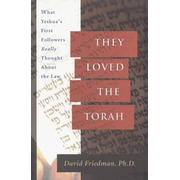 They Loved the Torah: What Yeshua’s First Followers Really Thought About the Law
They Loved the Torah: What Yeshua’s First Followers Really Thought About the Law
By David Friedman / Messianic Jewish Publishers
Did Yeshua observe the Law? Did Paul teach his congregations to abandon the Torah? Was the devout Jew, Peter, persuaded that the Commandments were cancelled? The answers you’ll find in this book may surprise you. Even though many Jews believe that Paul taught against the Law, this book disproves that notion. Most Christians are disconnected from the Torah; reading this book will reconnect them. Dr. Friedman makes an excellent case for his premise ![]() that all the first followers of Messiah were not only Torah-observant, but also desired to spread their love for God’s entire Word to the Gentiles to whom they preached.
that all the first followers of Messiah were not only Torah-observant, but also desired to spread their love for God’s entire Word to the Gentiles to whom they preached.
The Pentateuch as Narrative
By John H. Sailhamer / Zondervan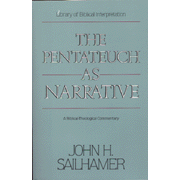
The Pentateuch as Narrative focuses on the narrative and literary continuity of the Pentateuch as a whole rather than individual books. It seeks to disclose how the original Jewish readers may have viewed this multivolume work of Moses. Its central thesis is that the Pentateuch was written from the perspective of one who had lived under the Law of the Covenant established at Mount Sinai and had seen its failure to produce genuine trust in the Lord God of Israel. In this context, the Pentateuch pointed the reader forward to the hope of the New Covenant, based on divine faithfulness. Throughout the commentary Dr. Sailhamer pays close attention to and interacts with a wide ![]() range of classical and contemporary literature on the Pentateuch, written by Jews, Catholics and Protestants.
range of classical and contemporary literature on the Pentateuch, written by Jews, Catholics and Protestants.
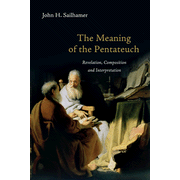 The Meaning of the Pentateuch: Revelation, Composition, and Interpretation
The Meaning of the Pentateuch: Revelation, Composition, and Interpretation
By John H. Sailhamer / IVP Academic
John H. Sailhammer has produced a monumental theological exposition of the Torah in The Meaning of the Pentateuch: Revelation, Composition, and Interpretation that will take its place alongside, and make an excellent companion to, his classic The Pentateuch as Narrative. This book is a crucial resource for Pastors, students, and scholars who not only want to understand the Pentateuch as a document from history, but ![]() as a richly religious, thematically coherent, and theologically authoritative Scripture.
as a richly religious, thematically coherent, and theologically authoritative Scripture.
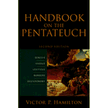 Handbook on the Pentateuch, Second Edition
Handbook on the Pentateuch, Second Edition
By Victor P. Hamilton / Baker
For more than twenty years, Victor Hamilton’s handbook has been introducing students to the Pentateuch. In this substantially revised second edition, Hamilton moves chapter by chapter (rather than verse by verse) through the Pentateuch. He examines the content, structure, and theology and provides useful commentary on overarching themes and connections between Old Testament texts. For those who wish to do![]() additional research, each chapter is appended with a bibliography of recent, relevant scholarship.
additional research, each chapter is appended with a bibliography of recent, relevant scholarship.
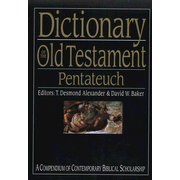 Dictionary of the Old Testament:
Dictionary of the Old Testament:
By Edited by T. Desmond Alexander & David W. Baker / Inter-varsity Press
The Dictionary of the Old Testament: Pentateuch is the first in a four-volume series covering the text of the Old Testament. Following in the tradition of the four award-winning IVP dictionaries focused on the New Testament and its background, this encyclopedic work is characterized by close attention to the text of the Old Testament and the ongoing conversation of contemporary scholarship. Editors T. Desmond Alexander and David W. Baker, with an international and expert group of scholars, explore the major themes and contours of the Pentateuch, examine and weigh historical issues while posing possible solutions, and offer both appreciative panoramas as well as close-up assessments of literary developments and their methods. A 2003 LOGOS Book Award ![]() Winner and an ECPA 2003 Gold Medallion Finalist.
Winner and an ECPA 2003 Gold Medallion Finalist.
Multiple books, but not all 5
Exodus, Leviticus, Numbers Holman Old Testament Commentary Volume 2
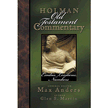 By Glen S. Martin / Broadman / Holman
By Glen S. Martin / Broadman / Holman
Whether you’re teaching or preaching, your goal is to clearly communicate God’s Word. This third volume of the Holman Old Testament Commentary offers apt quotes, compelling illustrations, insightful verse-by-verse exposition, well-defined principles and applications, a teaching plan for each passage, and stimulating discussion starters. An excellent resource for Bible teachers and pastors. 400 pages, hardcover from Broadman & Holman.![]()
Exodus-Deuteronomy: Ancient Christian Commentary on Scripture
By Inter-varsity Press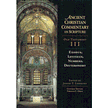 Let the wisdom of the early church fathers inform your reading of the Old Testament. Patristic interpreters from Greek, Latin, and Syriac traditions engage Scripture, offering spiritual and intellectual insights on critical issues of contemporary Christian faith and practice. Of particular note in this new ACCS volume are reflections from Origen’s 27th homily on Numbers. 400 pages, hardcover from InterVarsity.
Let the wisdom of the early church fathers inform your reading of the Old Testament. Patristic interpreters from Greek, Latin, and Syriac traditions engage Scripture, offering spiritual and intellectual insights on critical issues of contemporary Christian faith and practice. Of particular note in this new ACCS volume are reflections from Origen’s 27th homily on Numbers. 400 pages, hardcover from InterVarsity.
Although I wouldn’t want this to be the only commentary I had on Exodus – Deuteronomy, it is offering something not conveniently available elsewhere: a starting point for a sense![]() of the history of the interpretation of the biblical text. Many of the early church fathers were excellent exegetes and adept at making practical application of the text. —Steve
of the history of the interpretation of the biblical text. Many of the early church fathers were excellent exegetes and adept at making practical application of the text. —Steve
Leviticus & Numbers: The NIV Application Commentary
By Roy Gane / Zondervan Corp.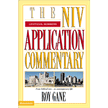
In this commentary, Roy Gane explains how Leviticus and Numbers tell of an epic journey to freedom, while illuminating and challenging modern conceptions of God. Vivid imagery of rituals, laws addressing tough issues, and narratives ranging from exultant to gut-wrenching show what it means to interact with the Lord and how to live according to his holy principles as part of a redeemed community of faith. The NIV Application Commentary Series helps bring both halves of the interpretive task together. This unique, award-winning series shows readers how to bring an ancient message into our postmodern context. It explains not only what the Bible meant but also how it speaks powerfully today.![]()
Genesis, the First Book of Moses
Commentary on Genesis
By Bruce K. Waltke & Cathi J. Fredricks / Zondervan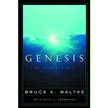
Hebrew and Old Testament expert Bruce Waltke looks at the book of Genesis as a work of theological literature. Thus, he focuses on primary aspects of the story (narrative), including characterization, plot, theme, scene, structure, foreshadowing and irony, and balances these issues with an emphasis on the theology of Genesis which both shapes and is shaped by the narrative. He looks at the ten divine initiatives in salvation history, each delineated by a “toledot” heading (“the account of the line of…”) followed by a transitional linkage. Waltke interprets the text using twelve levels of signification (sounds, syllables, words, phrases, clauses, sentences, frames/speeches, scene parts or incidents, scenes or episodes, acts or phases, sections/cycles, book/composition), and takes the best of form, source, narrative and literary criticism to offer readers one of the best looks at the theological and literary value of Genesis, the book of beginnings.![]() I believe that the “toledot” approach to the structure of Genesis is the correct one, which draws me to this intriguing commentary. —Steve
I believe that the “toledot” approach to the structure of Genesis is the correct one, which draws me to this intriguing commentary. —Steve
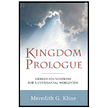 Kingdom Prologue: Genesis Foundations for a Covenantal Worldview
Kingdom Prologue: Genesis Foundations for a Covenantal Worldview
By Meredith Kline / Wipf & Stock
As intimated by the subtitle, Genesis Foundations for a Covenantal Worldview, the immediate literary focus of this study is the book of Genesis and its account of the formative ages in the eschatological movement of the kingdom of God from creation to consummation. As also indicated by the subtitle, our biblical-theological commentary on Genesis is designed to uncover the foundations of God’s covenantally administered kingdom ![]() with its major historical developments and its institutional structures and functions. In this way Kingdom Prologue seeks to provide an introductory sketch of the overall shape of the biblical worldview and the character of biblical religion.
with its major historical developments and its institutional structures and functions. In this way Kingdom Prologue seeks to provide an introductory sketch of the overall shape of the biblical worldview and the character of biblical religion.
Genesis: A New Commentary
By Meredith G. Kline, edited by Jonathan G. Kline / Hendrickson Publishers
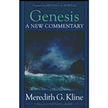 Now available for the first time from renown author, teacher and scholar Meredith G. Kline is a brief never-before-published commentary, Genesis: A New Commentary. This posthumously published commentary on Genesis was written just after the late scholar finished his magnum opus, Kingdom Prologue (see one item above), and distills his mature views on the book of Genesis and, indeed, on Scripture as a whole.
Now available for the first time from renown author, teacher and scholar Meredith G. Kline is a brief never-before-published commentary, Genesis: A New Commentary. This posthumously published commentary on Genesis was written just after the late scholar finished his magnum opus, Kingdom Prologue (see one item above), and distills his mature views on the book of Genesis and, indeed, on Scripture as a whole.
Following an introduction that addresses the canonical function, literary-thematic framework, theological story, and authorship of Genesis, Kline separates the text into 10 structural divisions, offering insightful interpretation of each. The commentary has been edited by Kline’s grandson Jonathan G. Kline and contains a foreword by Michael S. Horton. Genesis: A New Commentary will appeal to students, pastors, and laypeople who, like so many in the Reformed community, have admired or been transformed by Kline’s teaching and writings. Kline (1922-2007) was a well-respected conservative scholar. His commentary on Genesis is probably a very good one. Its main value appears to be that it provides a quick overview of the flow of the biblical narrative in the First Book of Moses. —Steve
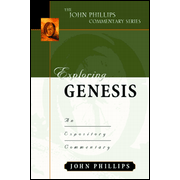 Exploring Genesis
Exploring Genesis
By John Phillips / Kregel Publications![]()
Genesis is a book of beginnings, including the world, man, sin and the names. Exploring Genesis examines the first book of the Bible in an understandable, scholarly, and biblically based manner.
Genesis, Everyman’s Bible Commentary
By Howard Vos / Moody Publishers 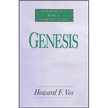
The Book of Genesis is filled with new beginnings—from the moment of creation to the latter days of Joseph and Jacob. In this accessible commentary, Howard Vos explores the Bible’s first book to help you gain a deeper understanding of where we came from, who we are, and what place we have in God’s magnificent plan. His keen insights make this the ideal starting point for studying the rest of the Bible. From theEveryman’s Bible Commentary.![]() Approx. 176 pages, softcover, Moody.
Approx. 176 pages, softcover, Moody.
Genesis, Tyndale Old Testament Commentary
By Derek Kidner / Inter-varsity Press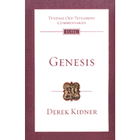 The Tyndale Old Testament Commentary series is an evangelical and scholarly treatment of the Scriptures.
The Tyndale Old Testament Commentary series is an evangelical and scholarly treatment of the Scriptures.
This work by Derek Kidner on Genesis begins with an introductory section discussing (among other things) the date, authorship, structure, and theology of Genesis. A brief outline of Genesis is offered. The commentary itself is based on sound linguistic and historical study. A good book for pastors or lay people.![]() Here is a briefer commentary, written on a popular level. Use commentaries like this one to get your orientation at the beginning of your study of Genesis. —Steve
Here is a briefer commentary, written on a popular level. Use commentaries like this one to get your orientation at the beginning of your study of Genesis. —Steve
Genesis, NIV Application Commentary
By John Walton / Zondervan Corp.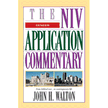
Genesis, the newest in the NIV Application Commentary series, traces God’s mastery in creation, covenant, and history. The initial chapters of Genesis show his mastery in bringing order out of chaos. The development of the covenant brought order to his relationship with his people-through revelation and the overcoming of obstacles. Finally, God brought order to the world through his people by battling the chaos of famine and providing food. In the beginning, as today, God loves the people he created, and it is his intention to bless them in spite of rebellion and sin. Noted scholar John Walton follows the three-tiered NIV Application format (Original Meaning, Bridging Contexts, and Contemporary Significance) to reveal how this first book of the Bible applies to us today.![]()
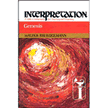 Genesis, Interpretation Commentary
Genesis, Interpretation Commentary
By Walter Brueggemann / Westminster / John Knox
A brilliant examination of God’s four ”calls” in Genesis-creation, Abraham, Jacob, Joseph-and God’s call to us today through the text. 384 pages.
Brueggemann is a prolific writer whose other works include a major opus, ![]()
Theology of the Old Testament. Some regard him as the foremost evangelical Old Testament interpreter. —Steve
Genesis 1-4: A Linguistic, Literary, and Theological Commentary
By C. John Collins / P & R Publishing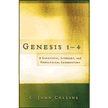 Genesis 1-4: A Linguistic, Literary, and Theological Commentary
Genesis 1-4: A Linguistic, Literary, and Theological Commentary
Foundational to all Christian thought, the opening chapters of Genesis are packed with information about our origins, our humanity, and the significance of God’s creative act.
As both a scientist and a Hebrew scholar, Collins fully enters into this thicket, examining how later intertestamental and New Testament writers shaped a Christian worldview. 352 pages, softcover from P & R. ![]()
Ancient Christian Commentary on Scripture Series: Genesis 1 – 11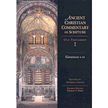 by Andrew Louth, ed. / Inter-varsity Press
by Andrew Louth, ed. / Inter-varsity Press
The rich tapestry of the creation narrative in the early chapters of Genesis proved irresistible to the thoughtful, reflective minds of the church fathers. Within them they found the beginning threads from which to weave a theology of creation, fall, and redemption. Following their mentor, the apostle Paul, they explored the profound significance of Adam as a type of Christ, the second Adam. The six days of creation proved especially attractive among the fathers as a subject for commentary, with Basil the Great and Ambrose producing well-known Hexaemerons. Similarly, Augustine devoted portions of five works to the first chapter of Genesis. As in previous volumes within the Ancient Christian Commentary on Scripture, the range of comment contained in Genesis 1-11 spans from the first century to the eighth, from East to West, and from Greek and Latin speakers to Syriac. Especially helpful in this volume is editor Andrew Louth’s supply of Septuagintal alternative readings to the Masoretic text, which are often necessary for understanding the fathers’ flow of thought. Genesis 1-11 opens up a treasure house of ancient wisdom, allowing these ![]() faithful witnesses, some appearing here in English translation for the first time, to speak with eloquence and intellectual acumen to the church today.
faithful witnesses, some appearing here in English translation for the first time, to speak with eloquence and intellectual acumen to the church today.
Ancient Christian Commentary on Scripture Series: Genesis 12 – 50 by J. Mark Sheridan, ed. / Inter-varsity Press 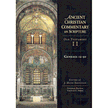 Genesis 12-50: Ancient Christian Commentary on Scripture Genesis 12-50 recounts the history of the patriarchs: Abraham, Isaac, Jacob, and Joseph. From their mentors Paul, Peter, Stephen, and the author of Hebrews, the early fathers learned to draw out the spiritual significance of the patriarchal narrative for Christian believers.
Genesis 12-50: Ancient Christian Commentary on Scripture Genesis 12-50 recounts the history of the patriarchs: Abraham, Isaac, Jacob, and Joseph. From their mentors Paul, Peter, Stephen, and the author of Hebrews, the early fathers learned to draw out the spiritual significance of the patriarchal narrative for Christian believers.
The Alexandrian school especially followed Paul’s allegorical use of the story of Sarah and Hagar as they interpreted the Genesis accounts. The Antiochene School eschewed allegorical interpretation but still sought moral lessons in the ancient narrative. For all of them the events pointed toward the promises of the age to come, the new age revealed in the resurrection of Jesus. Among the principal Greek-speaking commentators included within this volume, you will find Origen, Didymus the Blind, John Chrysostom, and Cyril of Alexandria. Among the Latin-speaking interpreters you will find Ambrose of Milan, Augustine of Hippo, Caesarius of Arles, and Bede the Venerable. Ephrem the Syrian is the most commonly cited Syriac-speaking interpreter, and the fifth-century Catena on Genesis provides access to such fathers as Eusebius of Caesarea, Basil the Great, Gregory of Nazianzus, Gregory of Nyssa, Didymus of Alexandria, Epiphanius of ![]() Salamis, Irenaeus of Lyons, Eusebius of Emesa, Severian of Gabala, and Theodore of Mopsuestia, among others.
Salamis, Irenaeus of Lyons, Eusebius of Emesa, Severian of Gabala, and Theodore of Mopsuestia, among others.
Genesis 1:1 – 11:26, New American Commentary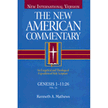
By Kenneth Mathews / Broadman / Holman
This commentary is an “exegetical and theological exposition of the Holy Scripture” based upon the New International Version text. The New American Commentary assumes the inerrancy of Scripture. The introduction analyzes the literary structure of Genesis, the structure of the Pentateuch and its relationship to Genesis, the theology of Genesis, Genesis and ancient literature, and creation and contemporary interpretation. The ![]() main body of the book consists of a verse-by-verse analysis and commentary on chapters 1-11:26. The author also includes 5 excursions: Translating 1:1-2, Interpreting the “Image of God”, The Human Soul, The Origin of Civilization in Ancient Near East Mythology, and The Revelation of the Divine Name.
main body of the book consists of a verse-by-verse analysis and commentary on chapters 1-11:26. The author also includes 5 excursions: Translating 1:1-2, Interpreting the “Image of God”, The Human Soul, The Origin of Civilization in Ancient Near East Mythology, and The Revelation of the Divine Name.
<img title=”401415: Genesis 11-50: New American Commentary [NAC] Genesis 11-50: New American Commentary [NAC] Genesis 11-50: New American Commentary [NAC]
By Kenneth A. Mathews / B&H Books
Genesis 11-50: New American Commentary [NAC] Unparalleled in its importance in declaring God’s will, Genesis is the foundation of God’s Word. Beginning with Abram’s call through Joseph’s death, Mathews describes Genesis as the ordered, cohesive, and consistent work of one author, Moses. His thorough knowledge of the Hebrew text in its original linguistic and cultural context, add to the exposition as he examines Genesis’ its literary and theological contours as well as its place within ![]() the Pentateuch and the larger biblical canon. He also examines early Jewish and Christian interpretations, and considers the narrative nature of the text.
the Pentateuch and the larger biblical canon. He also examines early Jewish and Christian interpretations, and considers the narrative nature of the text.
Word Biblical CommentaryGenesis 1 – 15 by Gordon Wenham / Thomas Nelson / W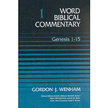
Now at a very special sale price! The Word Biblical Commentary is a contemporary series for pastors and serious Bible students who want to strengthen their theological understanding of Scripture with a conservative scholarly foundation. Each volume, written by a specialist, offers a thorough scrutiny of the data (historical, textual, and archaeological) produced during the current generation of biblical![]() inquiry.
inquiry.
See my note after the second volume. —Steve
Genesis 16 – 50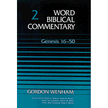 Genesis 16-50, Word Biblical Commentary by Gordon Wenham / Thomas Nelson / W
Genesis 16-50, Word Biblical Commentary by Gordon Wenham / Thomas Nelson / W
Out of his extensive examination of Genesis 16-50, Dr. Wenham has produced a careful commentary that interacts with contemporary scholarship and confirms him to be one of the finest evangelical commentators today. This commentary contains frequent reference to original languages and familiarity with Hebrew, while not essential, is helpful. Gordon J. Wenham is Senior Lecturer in Religious Studies at The College of St. Paul ![]() and St. Mary in Cheltenham, England. Dr. Wenham has the BA and MA from Cambridge University and the PhD from King’s College of London University.
and St. Mary in Cheltenham, England. Dr. Wenham has the BA and MA from Cambridge University and the PhD from King’s College of London University.
Wenham has written an excellent commentary on Leviticus, which makes me believe that his commentaries on Genesis will prove to be one of the best available on the foundation book of the Bible. —Steve
New International Commentary on the Old Testament – Genesis 1 – 17 by Victor P. Hamilton / Eerdmans Publishing Co. 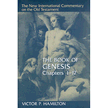 Victor P. Hamilton makes a major contribution to the study of Genesis with this volume on the first 17 chapters. His extensive introduction discusses issues such as structure, composition, theology, and canonicity related to Genesis. The commentary derives from Hamilton’s own translation and thoroughly expounds the meaning of these foundational chapters. Further, each section concludes with a discussion of how the New Testament used material from the section discussed. Written from an evangelical
Victor P. Hamilton makes a major contribution to the study of Genesis with this volume on the first 17 chapters. His extensive introduction discusses issues such as structure, composition, theology, and canonicity related to Genesis. The commentary derives from Hamilton’s own translation and thoroughly expounds the meaning of these foundational chapters. Further, each section concludes with a discussion of how the New Testament used material from the section discussed. Written from an evangelical ![]() perspective, Hamilton’s commentary will be valuable to those seeking an in-depth understanding of Genesis.
perspective, Hamilton’s commentary will be valuable to those seeking an in-depth understanding of Genesis.
Genesis 18 – 50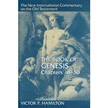 Genesis 18-50, New International Commentary on the Old Testament by Victor P. Hamilton / Eerdmans Publishing Co.
Genesis 18-50, New International Commentary on the Old Testament by Victor P. Hamilton / Eerdmans Publishing Co.
In this volume, Hamilton expounds Genesis 18-50 verse by verse and provides linguistic, literary, and theological commentary of its overarching theme; Yahweh’s faithfulness to his promised word and his covenant with those who were chosen to receive it. This evangelical, thorough work features a ![]() comprehensive introduction, copious footnotes, and references to the New Testament writers’ interpretations of Genesis.
comprehensive introduction, copious footnotes, and references to the New Testament writers’ interpretations of Genesis.
Genesis, Volume 1 (1:1-25:18): An EP Study Commentary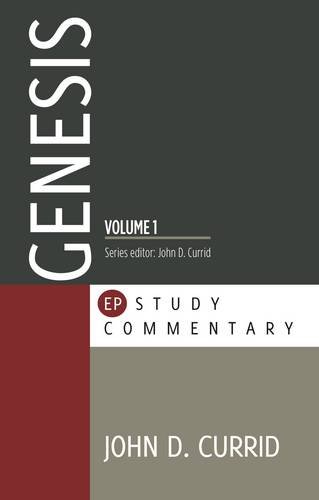
By John D. Currid / Evangelical Press
Genesis is a book about beginnings – the creation of the universe, the formation of mankind, the establishment of the covenant and the founding of the people of Israel. Many Christians regard the Old Testament as merely a collection of interesting stories to be taught in Sunday school, but which have little application for the church today except as providing examples or illustrations from a bygone, almost barbarous age. The truth is that almost every important church doctrine is found in ‘seed’ form in the book of Genesis – creation, fall, redemption, the doctrine of the Trinity, the promise of the Messiah, The establishment of the covenant and the hope of the resurrection are all to be found here. A ‘seed’ is planted in Genesis that sprouts and grows throughout the rest of the Bible until it finds its fruition in the person and work of Jesus Christ. God created the universe; it fell through the sin of humanity; and now God is in the process of redeeming it through the work of Christ until the time of the end when all things ![]() will reach their final place. This volume covers the period from the creation up to the death of Abraham and the marriage of Isaac and Rebekah.
will reach their final place. This volume covers the period from the creation up to the death of Abraham and the marriage of Isaac and Rebekah.
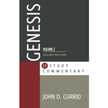 Genesis Volume 2 (26:1 – 50:26)
Genesis Volume 2 (26:1 – 50:26)
By John D. Currid / Evangelical Press
At the beginning of Scripture, the Holy Spirit through the prophet Moses introduces us at once to God in the essential fullness of his being. It is to God and God alone that we are brought. We hear him, through the divine revelation, penetrating earth’s silence, shining into the primordial darkness, with the sole intent of creating a sphere in which he might display his sovereignty, incomparability, and power. Unlike too many recent scholarly works on this book that have concentrated on the formation and development of the Pentateuch, John ![]() Currid is concerned to focus on the content and theology of this first book of the Bible. Indeed almost every important church doctrine is found in ‘seed’ form in the Book of Genesis.
Currid is concerned to focus on the content and theology of this first book of the Bible. Indeed almost every important church doctrine is found in ‘seed’ form in the Book of Genesis.
Exodus, the Second Book of Moses
|
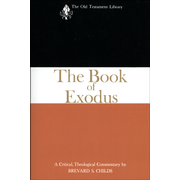 The Book of Exodus The Book of ExodusBy Brevard S. Childs / Westminster/John Knox Press A part of the Westminster/John |
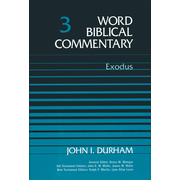 Word Biblical Commentary: Exodus, Volume 3 Word Biblical Commentary: Exodus, Volume 3By John Durham / Thomas Nelson The Word Biblical Commentary is a conservative and scholarly approach to the scriptures. This volume on Exodus by Durham begins with the text and historicity of the |
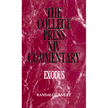 Exodus: The College Press NIV Commentary Exodus: The College Press NIV Commentaryy Dr. Randall C. Bailey / College Press Publishing The book of Exodus functions as the sequel to Genesis describing God’s deliverance of the children of Israel and the establishment of a covenant between God and Israel. The rest of the Old Testament looks back on the exodus of Israel from Egypt as the primary redemptive event in Israel’s history. This primary redemptive event became central to the Hebrew Bible and the New Testament. God’s redemption of Israel became the foundation for the Israelite faith and proactive reflected in the many Old Testament allusions to the Exodus as the basis for:
For the Christian, Exodus serves similar functions, pointing to the important work of redemption as seen in the New Testament’s record of the death, burial, and resurrection of Jesus Christ. These issues impact significantly the purpose and hermeneutics of this commentary. |
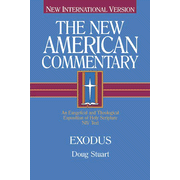 Exodus, New American Commentary Exodus, New American CommentaryBy Douglas K. Stuart / B & H Publishing Group Israel’s liberation from bondage to Pharaoh is one of the great turning |
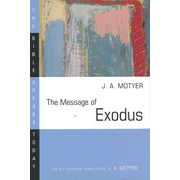 The Message of Exodus: The Bible Speaks Today Series The Message of Exodus: The Bible Speaks Today SeriesBy J. Alec Motyer / Inter-varsity Press The Book of Exodus holds an esteemed place in the Old Testament, and the shadow of its influence reaches as far as Revelation, where an abundance of themes from Exodus echo off its pages. In Exodus, Israel begins as an enslaved people, in service to Egyptian taskmasters. By the end of the book, Israel is again in service–to its sovereign Lord in the service of worship. Between these poles, Moses is called, God’s name is revealed, Israel is delivered, the law is given, the plan of the tabernacle |
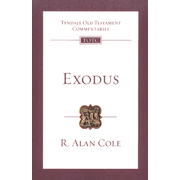 Exodus Tyndale Old Testament Commentary Exodus Tyndale Old Testament CommentaryBy R. Alan Cole / IVP Academic Exodus, Cole says, is ‘the centre of the Old Testament’. It recounts the supreme Old Testament example of the saving acts of God, narrates the instituting of Passover and enshrines the giving of God’s law. It portrays Moses, the prototype of all Israel’s prophets, and Aaron, the first high priest. This classic commentary has been completely retypset and presented in a fresh, vibrant new large paperback format, with new global branding. The Tyndale Bible Commentaries are designed to help the reader of the Bible understand what the text says and what it means. The Introduction to each book gives a concise but thorough treatment of its authorship, date, original setting and purpose. Following a structural Analysis, the Commentary takes the book section by section, |
| The Preacher’s Commentary Vol 2: Exodus By Maxie D. Dunnam / Thomas Nelson / W 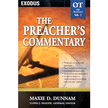 Volume 2: Exodus THE COMMENTARY FOR PREACHERS! For those on the firing line – in pulpits, classes, Bible study programs, and fellowships there is a distinctly different kind of commentary. The Preachers Commentary Series combines rich resources of historical setting and textual interpretation with spiritual insights and contemporary illustrations specifically designed for communicators. The result is are source by preachers/teachers for preachers/teachers. It is complete with outlines section by section expositions, illustrations and applications. This authoritative commentary provides the ultimate resource for sermon and lesson preparations. General editor Lloyd J. Ogilvie brings together a team of skilled and exceptional communicators blending sound scholarship with life related instructions. Their insights can guide you through every chapter and book of the Bible. And their organization and presentation of the material can help you share God’s Word more effectively with others.
Dr. Maxie D. Dunnam is president of Asbury Theological Seminary in Wilmore, Kentucky. Widely known as an evangelist, leader and pioneer in small group ministries, he organized and served three United Methodist churches before joining the Upper Room Fellowship. He created the Upper Room Crusillo that later became The Walk to Emmaus. He has served other churches and authored over 40 books as well as video/study correspondence courses. He and his wife, Jerry Lynn, have three children. |
Exodus: A Mentor Commentary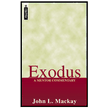 By John L. Mackay / Christian Focus Public The Book of Exodus is about a journey: a journey out of Egypt, but more particularly a journey from a land where God’s power, sovereignty and continuing interest in his people could be easily questioned, to a place where God dwelt in the midst of his people. Exodus describes God’s power, his redemption of his people, his covenant requirements at Sinai, and the rules of his worship. 623 pages, hardcover from Christian Focus Publications. |
| God of Freedom & Life: A Commentary on the Book of Exodus By Stephen Binz / Liturgical Press 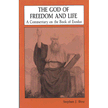 No book of the Bible is more important for an understanding of salvation than the Book of Exodus. During their journey from a life of slavery and death to a life of freedom, the Israelites learned who God was, and the kind of people He wanted them to be. They learned that God’s law was the true freedom. This commentary helps the reader |
| Exodus 1-18, Anchor Bible Commentary By William Propp / Random House, Inc. 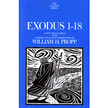 Exodus 1-18, Anchor Bible Commentary Exodus 1-18, Anchor Bible CommentaryIn this masterful translation and analysis, you’ll explore events centered around the conflict between God and pharaoh, from the birth of Moses to manna falling from the skies. Exhaustive, meticulous, and brilliantly researched, Propp’s commentary will soon be regarded as the definitive analysis of what’s considered to be the heart of the Hebrew Bible. 672 pages, hardcover from Doubleday. |
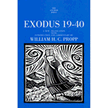 Exodus chaps. 19-40: Anchor Yale Bible Commentary [AYBC] By William H.C. Propp / Yale University Press The long-awaited conclusion of William H. C. Propp’s masterful study of Exodus, this informative, clearly written commentary provides a new perspective on Israelite culture and on the role of ritual, law, and covenant in biblical religion.Exodus 19-40 sets a new standard in biblical scholarship. Thorough and up-to-date, it is the first commentary on Exodus to include critical textual evidence from the recently edited Dead Sea Scrolls. Informed by Propp’s deep understanding of ancient cultural mores and religious traditions, it casts new light on the Israelites’ arrival at Sinai, their entry into a covenant with God, their reception of the Law, their worship of the golden calf, and their reconciliation to God. |
The Ten Commandments
|
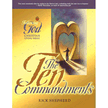 The Ten Commandments: The Heart of God for Every Person By Rick Shepherd / Amg Publishers Do you know anyone who has never broken any of the Ten Commandments? Why did God issue these laws for Israel and mankind if they are so difficult to live up to? What relevance do these laws etched upon ancient tablets have for us today? The Ten Commandments is a twelve-week, five-days-a-week, interactive study which provides a historical and cultural backdrop of the time the Commandments were issued, an in-depth look at each commandment and the spirit and overarching purpose of each law, and an intense look at how Jesus Christ is the culmination of the Ten Commandments. |
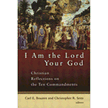 I Am the Lord Your God: Christian Reflections on the Ten Commandments I Am the Lord Your God: Christian Reflections on the Ten CommandmentsBy Carl E. Braaten & Christopher R. Seitz, eds. / Eerdmans Publishing Co. This book explores the place of the Ten Commandments in modern civil society, their relation to the natural law, their relevance for Christian instruction, and how they can help bring clarity to contemporary ethical issues such as abortion, killing, homosexuality, lying, greed, and many others. Written by highly respected ethicists, theologians, and Bible scholars from across the Christian spectrum–Catholic, Orthodox, Anglican, Lutheran, |
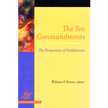 The Ten Commandments: The Reciprocity of Faithfulness By Edited by William P. Brown / Westminster / John Knox Featuring new and classic essays surveying the scholarly, ethical, and biblical debate surrounding the Ten Commandments, Brown’s volume is divided into three sections: the history of interpretation, contemporary reflections on |
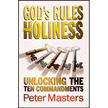 God’s Rules for Holiness: Unlocking the Ten Commandments God’s Rules for Holiness: Unlocking the Ten CommandmentsBy Peter Masters / Wakeman Trust Taken at face value the Ten Commandments are binding on all people, and will guard the way to Heaven, so that evil will never spoil its glory and purity. But the Commandments are far greater than their surface meaning, as this book shows. They challenge us as Christians on a still wider range of sinful deeds and attitudes. They provide positive virtues as goals. And they give immense help for staying close to the |
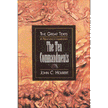 The Ten Commandments: A Preaching Commentary The Ten Commandments: A Preaching CommentaryBy John Holbert / Abingdon Press This book, the first in the Great Texts series from Abingdon, offers a preaching commentary on the Ten Commandments, which includes exegetical and homiletical resources for the pastor. Holbert seeks to provide the context for the commandments and their relationship to other parts of the Hebrew Bible. He also seeks to show how the New Testament writers viewed and used the Ten Commandments, as well as the history of their influence in both Christian and |
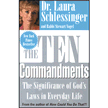 The Ten Commandments: The Significance of God’s Laws in Everyday Life By Laura Schlessinger / Harpercollins Publishing The first direct communication from God, the Ten Commandments are the blueprint of His expectations of us, moral principles that focus on real-life issues relating to God, family, sex, work, charity, property, speech, and thought. Now, acclaimed psychotherapist Dr. Laura Schlessinger offers a fascinating exploration of these sacred precepts. Written in collaboration with Rabbi Stweart Vogel, The Ten Commandments incorporates lively discussion on the Bible and the |
| The Ten Commandments & Modern Society By Stephen McDowell / Providence Foundation  Jesus Reiterated what all the Bible teaches: that God’s Law/Word, which is summarized by the Ten Commandments, contains principles that, if obeyed, produce life-life for men and nations–but, if ignored, produce death. Americas laws were based upon God’s higher law. This higher law, as summarized in the Ten Commandments, used to be taught to all Americans. It was greatly revered, and all looked to obey it. Today, few obey, revere, or even know His commands. Many people are doing all they can to remove any vestige of His law from our nation, claiming they are a great detriment to society. In 1980 the Supreme Court ruled in Stone v. Graham that the public schools of Kentucky could not display the Ten Commandments on the walls. The court said: “If the posted copies of the Ten Commandments are to have any effect at all, it will be to induce the schoolchildren to read, meditate upon, perhaps to venerate and obey, the Commandments. ” About 1. 7 million Americans are behind bars today- 1 in every 155. To learn to not steal or murder might not be too bad an idea to help deal with this problem. Marriages ending in divorce have increased exponentially in the last three decades–to learn not to commit adultery seems a pretty Jesus Reiterated what all the Bible teaches: that God’s Law/Word, which is summarized by the Ten Commandments, contains principles that, if obeyed, produce life-life for men and nations–but, if ignored, produce death. Americas laws were based upon God’s higher law. This higher law, as summarized in the Ten Commandments, used to be taught to all Americans. It was greatly revered, and all looked to obey it. Today, few obey, revere, or even know His commands. Many people are doing all they can to remove any vestige of His law from our nation, claiming they are a great detriment to society. In 1980 the Supreme Court ruled in Stone v. Graham that the public schools of Kentucky could not display the Ten Commandments on the walls. The court said: “If the posted copies of the Ten Commandments are to have any effect at all, it will be to induce the schoolchildren to read, meditate upon, perhaps to venerate and obey, the Commandments. ” About 1. 7 million Americans are behind bars today- 1 in every 155. To learn to not steal or murder might not be too bad an idea to help deal with this problem. Marriages ending in divorce have increased exponentially in the last three decades–to learn not to commit adultery seems a pretty |
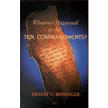 Whatever Happened to the Ten Commandments? Whatever Happened to the Ten Commandments?By Ernest Reisinger / Banner Of Truth Whatever happened to the Ten Commandments? Drawing extensively on the neglected Larger Catechism of the Westminster Assembly, this book examines the scope of each of the commandments in turn and helps us towards a right understanding of God’s perfect requirements for our lives. . One of |
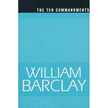 The Ten Commandments The Ten CommandmentsBy William Barclay / Westminster / John Knox William Barclay saw the Ten Commandments as the universal foundation of all things: the basic laws on human conduct in society and the cornerstone of community existence. Drawing on his vast knowledge of both Old and New Testaments, Professor Barclay examines the ways in which the Ten Commandments demand reverence for God and respect for humankind. This book shows you how |
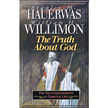 God Speak to Us, Ten Commandments God Speak to Us, Ten CommandmentsBy Stanley Hauerwas / Abingdon Press |
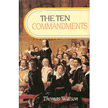 The Ten Commandments The Ten CommandmentsBy Thomas Watson / Banner Of Truth In this book Thomas Watson continues his exposition of the Shorter Catechism drawn up by the Westminster Assembly. Watson was one of the most popular preachers in London during the Puritan era. His writings are characterized by clarity, raciness and spiritual richness. The series of three volumes, of which this is the second, makes an ideal introduction to Puritan literature. There are few matters about which the Puritans differ more from present-day Christians than in their assessment of the importance of the Ten Commandments. The commandments, they held, are the first thing in Christianity which the natural man needs to be taught and they should be the daily concern of the Christian to the last. |
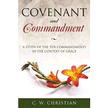 Covenant and Commandment: A Study of the Ten Commandments in the Context of Grace By C. W. Christian / Smyth & Helwys Publishing, Inc. It is Israel’s conviction that God is the kind of God who makes promises and keeps them. This conviction, as Christian contends, has given creative power and shape to the whole of Hebrew and Christian history. As the book continues, the author contends that the Hebrew law, especially that expression called the Ten Commandments, can best be understood as a joyful response to God’s covenant grace, a response that embraces every aspect of our being: community with God, with each other, and with God’s world. |
The Tabernacle
|
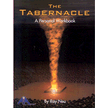 The Tabernacle Study Guide The Tabernacle Study GuideBy Ray Neu / Vision Video The Tabernacle is one of the most significant concepts in the Bible. Physically, it was a tent used for worship in the wilderness. More importantly, however, the Tabernacle represented a focal point for spiritual understanding. It presented a plan of redemption that foreshadowed the coming of Jesus Christ. Today the Tabernacle provides insight into worship. This insight can help us develop a more intimate relationship with God. This workbook is designed to be used in conjunction with |
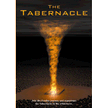 The Tabernacle, DVD The Tabernacle, DVDBy Vision Video Explore the ancient meeting place between sinful man and a holy God in this intriguing presentation. Stunning three-dimensional computer-generated depictions of the |
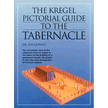 Kregel Pictorial Guide to the Tabernacle Kregel Pictorial Guide to the TabernacleBy Tim Dowley / Kregel Publications What was the purpose of the tabernacle? What did it look like? What is the relationship between the tabernacle and the temple? What finally happened to the Ark of the Covenant? Has the tabernacle any significance for the Christian today? All these questions–and many more–are answered in this fascinating and detailed description |
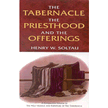 The Tabernacle, the Priesthood, and the Offerings By Henry Soltau / Kregel Publications This exhaustive and richly suggestive treatment of the Tabernacle, the priesthood, and the offerings is a classic in its field. The author minutely discusses every part of his subject, yet there is no undue straining of the types, nor fanciful spiritualizing. Throughout the book there is a wealth of direct, practical teaching regarding |
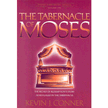 The Tabernacle of Moses The Tabernacle of MosesBy Kevin Conner / City Christian Publishing This book by Australian Bible teacher Kevin Conner strives to present readers with a reasonable working knowledge of the Tabernacle of Moses, finding in the elements of the Tabernacle insights that relate to the story of divine redemption. |

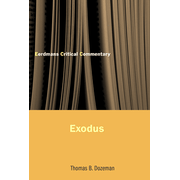 Eerdmans Critical Commentary: Exodus
Eerdmans Critical Commentary: Exodus